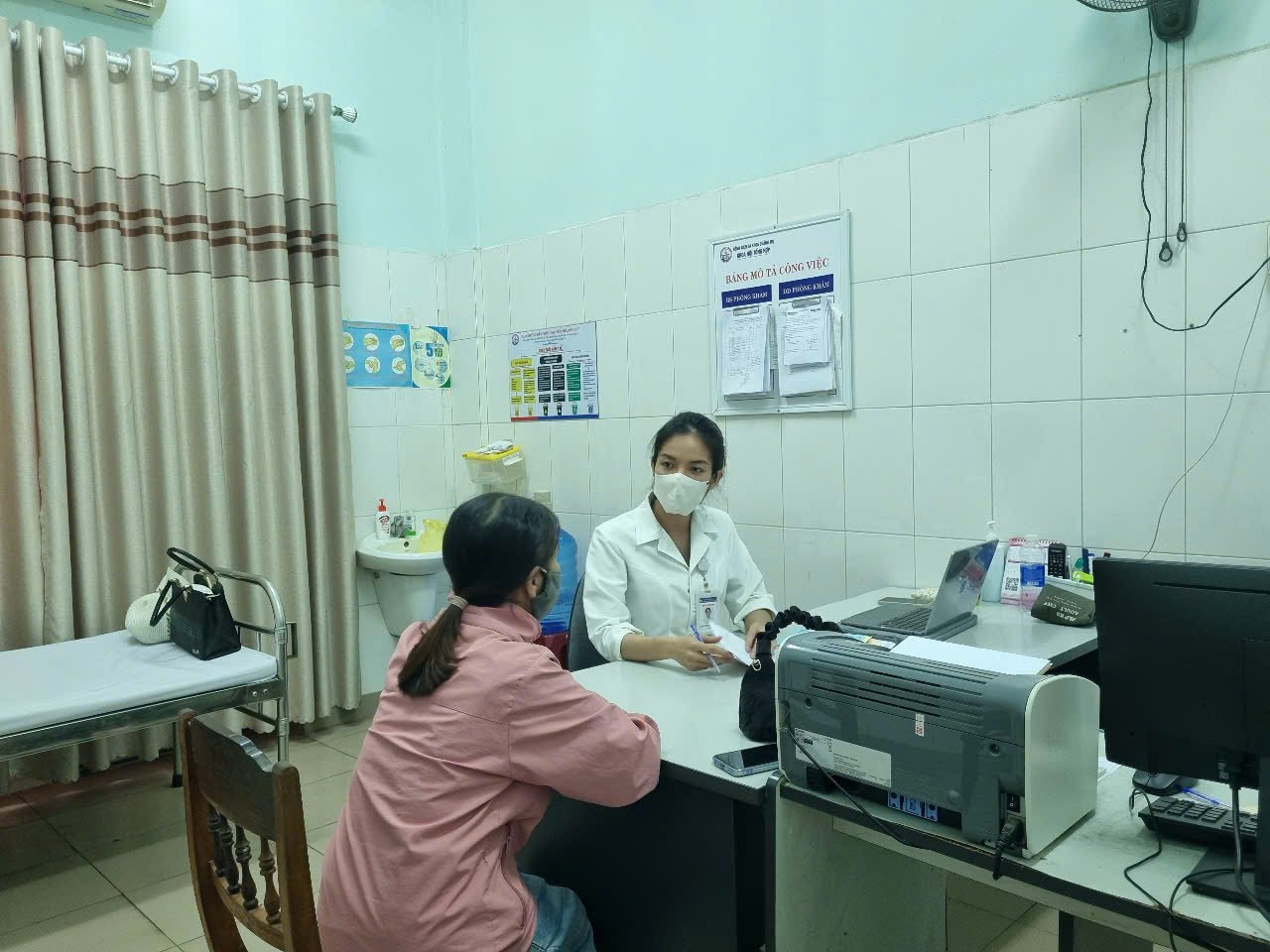Doctors from the Endocrinology Clinic, Provincial General Hospital advise on nutrition and diabetes treatment for outpatients - Photo: TN
Recently, patient LVL (50 years old) in Gio Linh district was admitted to the General Internal Medicine Department, Quang Tri General Hospital for inpatient treatment. Mr. L. came to the hospital with blurred vision and swollen legs due to complications of diabetes. “I discovered I had diabetes a few years ago but only took medication occasionally.
I had been following it for a while, and I thought it was normal to stop taking the medicine, so I was subjective, did not have regular check-ups, and did not follow the doctor's recommendations on my diet. Therefore, the disease silently progressed without me knowing. Since after Tet until now, I often feel tired, my eyes are blurry, my legs are swollen, sometimes I lose sensation, and I have difficulty walking. Only after going to the doctor did I know that the disease had reached a serious stage," said Mr. L.
According to data from the Provincial General Hospital, on average, every day there are about 40 diabetic patients examined and treated as outpatients; 25 - 30 diabetic patients treated as inpatients at the hospital. Despite many warnings, there are still many cases of patients being hospitalized in serious condition and having to treat cardiovascular and kidney diseases... due to complications from diabetes. This is a chronic disease that progresses silently in the body, so many people do not detect the disease in time. However, there are also people who detect the disease early but are subjective in treatment, causing the disease to progress severely, such as in the case of Mr. L.
In particular, in the past, Quang Tri General Hospital has received a number of cases of diabetic patients with acute complications due to treatment with traditional medicine. Among them, there were cases of diabetic patients who took traditional medicine and various leaves and had to be hospitalized with high fever, difficulty breathing, severe pneumonia due to poor blood sugar control or cases of acute kidney failure due to abandoning Western medicine and switching to traditional medicine in pill form.
According to specialist doctor II Le Tien, Head of the Department of Internal Medicine, Provincial General Hospital, in folk medicine there are many types of medicinal plants used to treat diseases, including plants that have the effect of lowering blood sugar, however, there is no specific research on whether or not they can prevent complications of diabetes.
Herbal plants contain therapeutic properties but also harmful substances, so drinking the whole plant for a long time causes the liver and kidneys to work beyond their normal capacity, leading to long-term functional decline.
Therefore, people with diabetes, regardless of the treatment method, need to monitor their response to treatment and their health status regularly. Before using any medication, they must consult a doctor, and avoid taking medication as directed by relatives, friends, or sellers on social networks.
What is worrying now is that in the community, more than 50% of people have diabetes but have not been diagnosed. The increasing and younger number of people with diabetes is an alarming health issue in the community. In addition to family history, the lives, work, and eating and living habits of many people, especially the young generation today, are unbalanced, leading to an increased risk of disease.
According to Dr. Tien, diabetes is not only a blood sugar metabolism disorder, but also a potential cause of a series of dangerous complications, seriously affecting the quality of life and even threatening the patient's life. Acute complications (which often occur quickly and can be life-threatening if not treated promptly) include: hypoglycemia due to insulin overdose, skipping meals or excessive exercise, symptoms include tremors, sweating, dizziness, confusion, and even coma; acute hyperglycemia, which occurs when blood sugar levels increase suddenly, can lead to diabetic ketoacidosis (DKA) or hyperosmolar state - two serious complications that require emergency care.
Chronic complications (the most dangerous and common group of complications) include complications on large blood vessels causing cardiovascular diseases such as myocardial infarction, heart failure, stroke; peripheral blood vessels (easily leading to vascular occlusion, limb necrosis requiring amputation); complications on small blood vessels causing diabetic retinopathy, which can lead to blindness, kidney failure, numbness, pain, loss of sensation, especially in the limbs, increasing the risk of foot ulcers and infections.
“To reduce the risk of complications, patients need to control blood sugar at a stable level; comply with the doctor's treatment regimen; maintain a healthy lifestyle including a reasonable diet, regular exercise, no smoking...
In particular, it is necessary to conduct regular check-ups and screening (especially for those with one or more risk factors) to detect diabetes early, thereby having ways to respond, manage, and treat to slow the appearance and progression of complications of this disease," said Dr. Tien.
Thuy Ngoc
Source: https://baoquangtri.vn/khong-chu-quan-voi-benh-dai-thao-duong-193058.htm



![[Photo] Readers line up to visit the photo exhibition and receive a special publication commemorating the 135th birthday of President Ho Chi Minh at Nhan Dan Newspaper](https://vphoto.vietnam.vn/thumb/1200x675/vietnam/resource/IMAGE/2025/5/17/85b3197fc6bd43e6a9ee4db15101005b)




![[Photo] Nearly 3,000 students moved by stories about soldiers](https://vphoto.vietnam.vn/thumb/1200x675/vietnam/resource/IMAGE/2025/5/17/21da57c8241e42438b423eaa37215e0e)





















































































Comment (0)